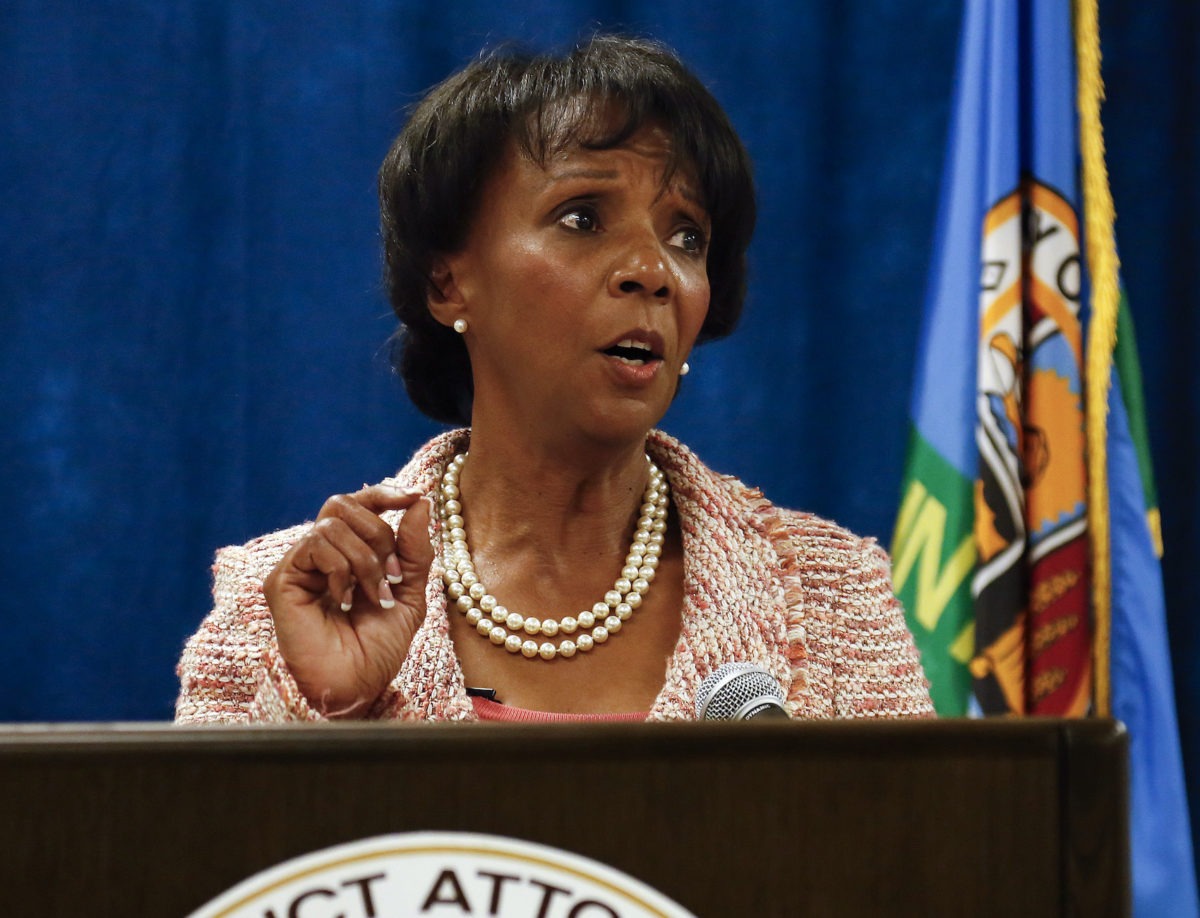Los Angeles County D.A. Jackie Lacey Skipped The First Democratic Debate of the Race
After two terms at the helm of the nation’s largest prosecutor office, Lacey has drawn pointed criticism from community advocates who say she is standing in the way of criminal justice reform.

Jackie Lacey, the incumbent Los Angeles County district attorney, was a no-show Wednesday night at the first debate for Democratic candidates in the DA race, leaving her opponents free to point out her absence on the dais and on the issues.
The event, held at the California African American Museum in Los Angeles and sponsored by Black Lives Matter, the ACLU of Southern California, and Loyola Law School, was the first public debate opportunity for candidates to engage with voters ahead of a March 3 primary election. But when organizers announced that Lacey, a two-term prosecutor, said she could not attend due to a scheduling conflict, some attendees in the audience booed and jeered.
“Lacey continues to show how little interest she has in the community she is supposed to serve,” Patrisse Cullors, a cofounder of the Black Lives Matter Global Network, said in an interview with The Appeal. “When she has refused to show up to debates, refused to show up to public meetings, she is refusing to listen to the people of Los Angeles, especially those people who have been marginalized by incarceration, police violence and homelessness. She doesn’t deserve to be in elected office.”
Lacey’s re-election campaign did not immediately respond to an email seeking comment.
Former San Francisco district attorney and DA challenger George Gascón wasted little time criticizing Lacey’s record on accountability for officers accused of brutality. Since her election in 2012, Lacey has not pursued a criminal case against a single LAPD officer after a shooting. In an email to The Appeal last month, Lacey said, “If a peace officer’s conduct rises to the level of a provable crime, my office will file criminal charges.”
“This is the only county in the world where the chief of police came to the DA and said, ‘Please prosecute a case [of officer misconduct],’” Gascón said during the debate, a reference to LAPD Chief Charlie Beck’s call after the fatal shooting of Brendon Glenn by Officer Clifford Proctor. “She refused to move forward and prosecute the case.”
DA candidate Rachel Rossi, a former public defender in Los Angeles, said prosecutors must also be held more accountable and have been operating under a “shroud of darkness” for too long. “The people need to know, and need oversight.” She said if elected, she would consider outside audits of the prosecutor’s office and look into disclosing more data about who is being charged and why.
Candidates also answered questions from people who had been personally impacted by the criminal justice system, including some who had been formerly incarcerated and who criticized the incumbent DA. Helen Jones, who sued the city over the death of her son who was incarcerated at the Twin Towers Correctional Facility, told the candidates Lacey’s office “did nothing” in her case, and asked what they would do differently if elected. Said Rossi: “You are a victim and you should have a district attorney who’s consoling you.”
Lacey’s debate absence came one day after the Los Angeles County Democratic Party endorsed Gascón, who is also a former chief of the Los Angeles Police Department. After the party’s vote, Lacey said “the endorsement I care the most about is the endorsement of the people of L.A. County.”
Gascón and Rossi share many of the same progressive policy positions, including limiting the use of pretrial detention, ending the use of money bail, and abolishing the death penalty. On those and other issues, community advocates say Lacey has failed. After she was elected to her first term, Lacey enjoyed broad support from reform advocates who saw hope in the leadership of a female, Black and Democratic district attorney. But she is now on record for opposing an end to money bail, as well as changes to the felony murder law that passed in the California legislature last year. Lacey has sent 22 people to death row since 2012, and she continues to use the death penalty. “California voters have twice failed to abolish the death penalty” by referendum, she told The Appeal in November.
“District attorneys have the power to decide who to prosecute, what punishments to seek, whether to seek the death penalty or not,” Stephen F. Rohde, a former chair of the ACLU Foundation of Southern California, told KABC-TV in Los Angeles. “This is a powerful office.”
